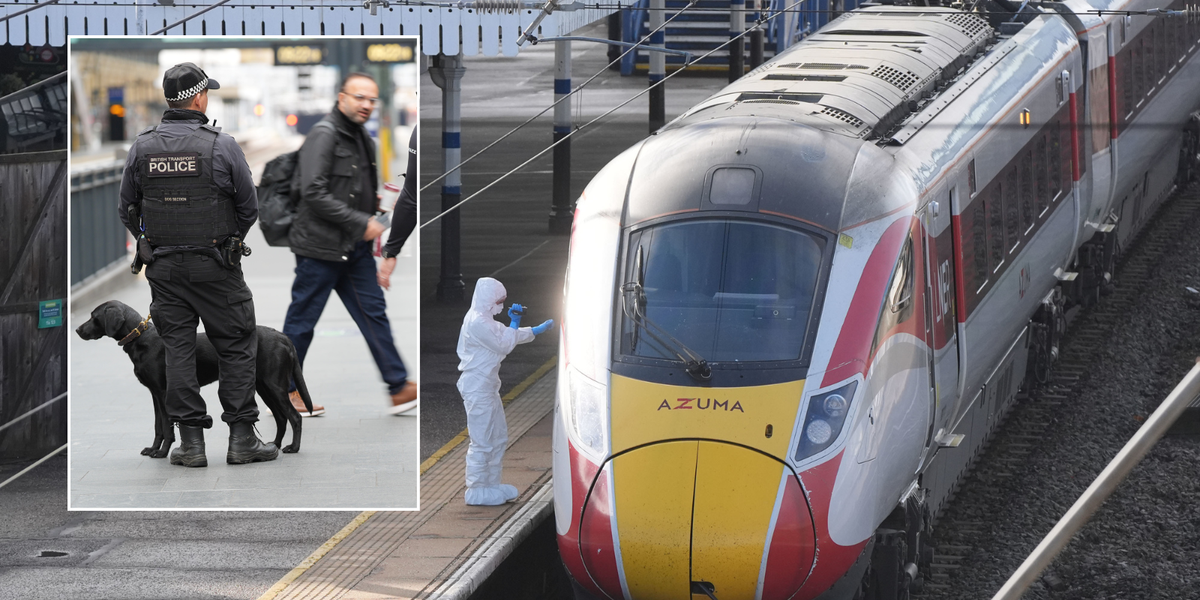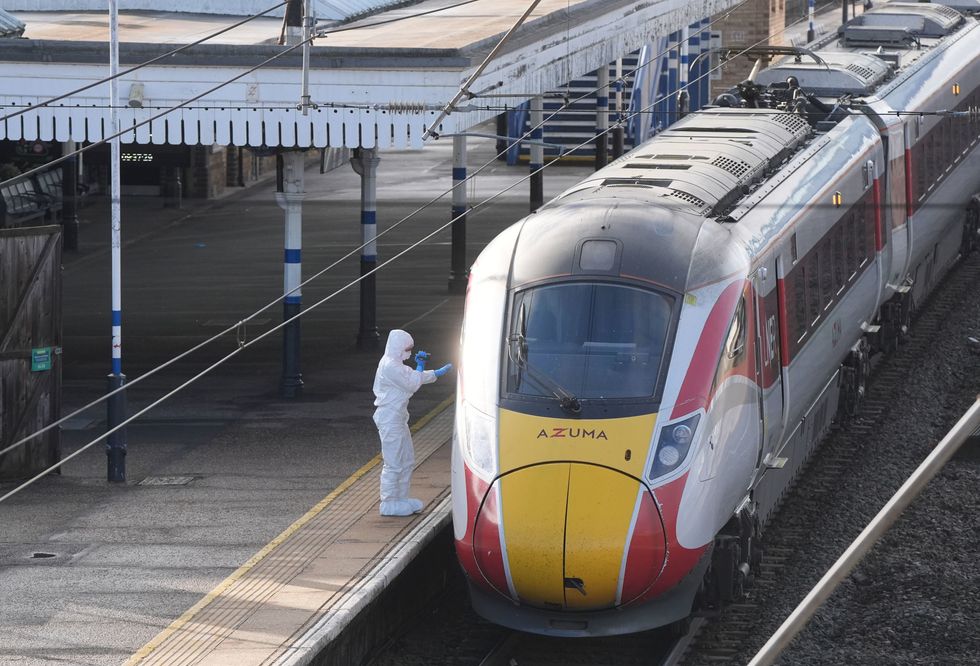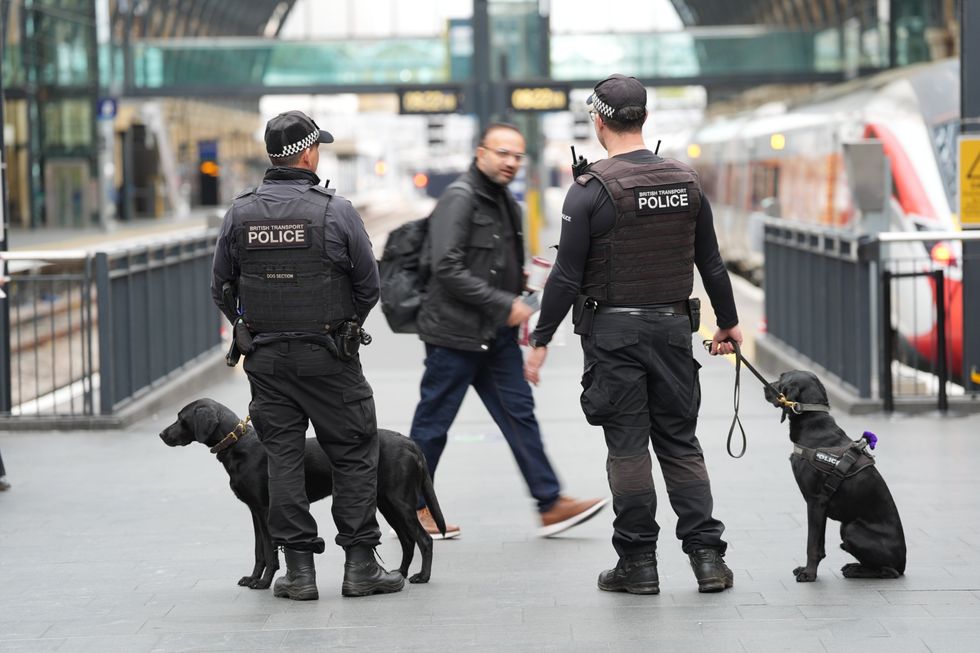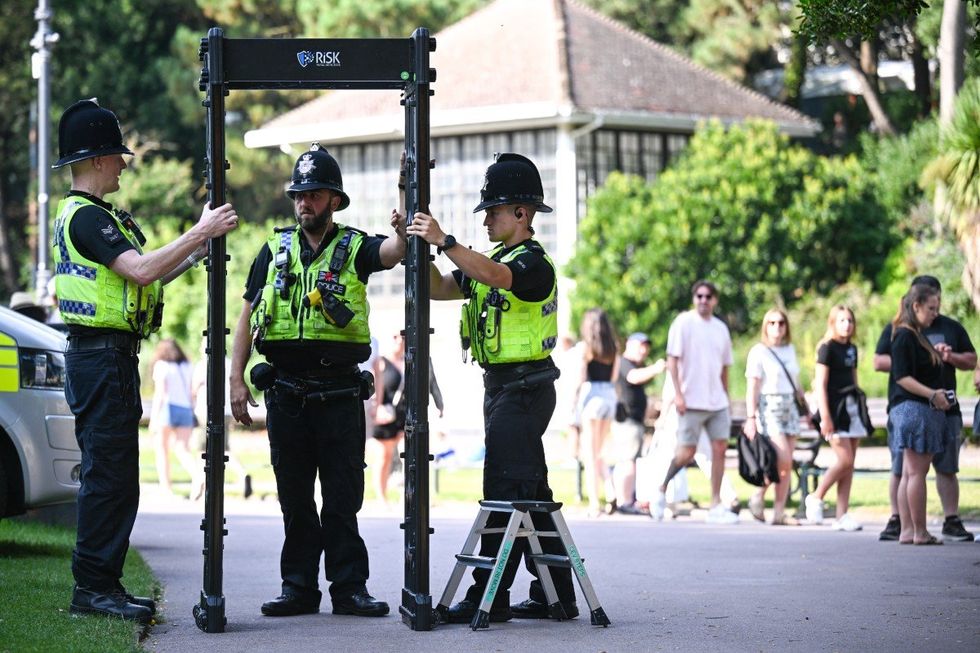Cuts to security staff across Britain’s rail networks have “gone too far” and risk exposing the public to disorder, former transport police officers told GB News.
In the wake of the horrific mass stabbing attack aboard an LNER train from Doncaster to London, former police officers have told the People’s Channel that seeing extra security in and around railway stations will help the public feel safer.
The attack, which occurred in Huntingdon, Cambridgeshire, last Saturday, resulted in 11 people being injured, including members of the public and a member of LNER staff.
Anthony Williams, 32, appeared at Peterborough Magistrates’ Court on Monday, charged with 10 counts of attempted murder.
Now, former officers have told GB News the public want to see more being done to tackle anti-social behaviour and feel safer when using Britain’s train network.
“Obviously, I would like to see more security,” Andy Trotter, a former Chief Constable of British Transport Police, told The People’s Channel.
“Five million individual journeys are being made a day, thousands of train journeys, you’ve got to be practical about it at the same time.
“But I think people want to see more visibility, I think the cutbacks in security such as train guards and conductors, have gone far too far. While this wouldn’t have stopped the attack on Saturday, I think it is the ordinary everyday disorder people a concerned about.”
Officers investigate the scene on the LNER train at Huntingdon station
|
PA
Airport-style metal detectors at railway stations have been floated as one idea to help police crack down on crime, but this suggestion has been played down by Transport Secretary Heidi Alexander, who said the proposals would “make life impossible”.
She told Sky News: “I don’t think airport-style scanners would be the way to go.
“We have thousands of railway stations across the UK, and those stations have multiple entrances, multiple platforms.
“What we can’t do is make life impossible for everyone, but we do need to take sensible and proportionate steps to make the public transport network safe.”
Former BTP officer Gary Hayes echoed Ms Alexander’s comments, saying the plans would only work if the force had the staffing power to respond to incidents.
Mr Hayes, who was one of the first responders at the scene of the 7/7 bombings, told GB News: “If I were to reflect on having been on numerous knife arch jobs while I was at the BTP…
“They only work if you have the resources, if it takes pushing people through. You can’t make them do it.
“Very annoyingly, there are a lot of impracticalities of having knife arches at stations, I would suggest you could get away with it at major hub stations, but again, it just depends on the number of officers you have.”
Police officers at London King’s Cross station after the incident in Cambridgeshire
|
PA
Recent figures have suggested damning recruitment levels, as the number of officers has stagnated across the branch.
The number of BTP officers has remained almost level over the past five years, with the branch seeing an increase of just eight officers since 2019, from 2,844 to 2,852.
Former Conservative transport minister Sir John Hayes has previously backed calls for further staffing.
He said: “Railway stations need to be staffed…This silly idea that we can have unmanned railway stations needs to be abandoned.”
Putting knife arches in every station is ‘not practical’ claimed Heidi Alexander
| PA
Fare dodging was another issue brought up as something which had become more “normalised”.
A report by the Office for Rail and Road released in August said: “Rail staff we spoke to described how fare evasion is becoming normalised among certain passenger groups and increasingly more challenging to tackle.”
Staff reported being met with “aggressive and abusive behaviour” when trying to check the tickets of fare-dodgers.
The report added: “Some fare evaders consider that it is a victimless crime and are either not aware of or are undeterred by the consequences of being caught.”
The topic was thrown into the spotlight after Shadow Justice Secretary Robert Jenrick filmed himself chasing fare dodgers at Stratford Station in east London.
WATCH: Robert Jenrick confronts brazen fare dodgers as Sadiq Khan’s London slides into lawlessness
Mr Jenrick told GB News: “People feel like mugs. They’re paying their fares on the tram or the bus or the tube if they’re down in London, they’re playing by the rules in their daily lives.
“They’re not nicking things from shops, but they see people doing these things, and there’s a sense that it’s happening with impunity, that they’re almost being decriminalised at the moment.
“And the public realm, the parts of the world, the country that we all live in, the town square, the high streets, it feels like it’s going downhill a bit, doesn’t it?”
Mr Jenrick’s comments were echoed by Mr Trotter, who said he received some backlash for speaking out in support of the senior Tory’s video.
Mr Trotter told GB News: “People see people jumping the barriers and not paying and then doing nothing, it feels lawless.
“I got a bit of stick for it but I think [Mr Jenrick] raised some issues that people are really concerned about.
“You see people jump a barrier at you know and there’s nobody going through after them and you see the real staff too frightened to do anything.”
Kevin Foster, who served as a Transport Minister under Liz Truss, also said: “It’s impossible to man every station given how much usage varies, eg Chapelton in Devon gets only 200 passengers a year versus a London terminus having millions a month. In reality, insisting on staffing every station would result in a Beeching-style wave of closures of many rural and edge-of-town stations. Yet more could have ticket barriers, which help cut crime and anti-social behaviour generally. There are still a small number of stations, eg Paignton, which have long-distance services to London but no ticket barriers. As Rob’s video showed it also needs to be followed up and less tolerance shown to those riding off the back of others payments, especially when they will often engage in other criminal activity.
“Airport-style security is not practical given passenger numbers and the type of rural stations I mention above, but CCTV, especially facial recognition software can help keep threats off the trains (Most larger stations have CCTV and all trains do as well) and we could increase the number with body-worn cameras, eg all Train Managers could wear them.
“Other steps could be allowing more specific staff to carry items like pepper spray (although I don’t support wider legalisation of this), eg Guards and Revenue Enforcement, having been suitably trained in its use.”
Trudy Harrison, who was also a former Transport Minister, added: “As a frequent train traveller I feel increasingly concerned about the anti-social behaviour on the services. Train managers are frequently deployed as security guards, asking for music to be turned down and language to be toned down, breaking up fights and tackling the ills of society. If we want more decent people to use our trains, a zero tolerance approach to anti-social behaviour is a must. CCTV is already installed on many services, I don’t blame train operators at all this is a general reflection of a society in decline, lacking basic manners and consideration of others. It doesn’t seem to happen abroad… and would not be tolerated in many other countries.”
A spokesman for the Rail Delivery Group, which represents train companies, said: “We need to strike the right balance addressing genuine, honest mistakes made by customers and taking firm action against those who deliberately and persistently seek to exploit the system.”
A Department for Transport spokesperson said: “The British Transport Police (BTP) was allocated £415million this year, an increase of almost six per cent on the previous year in recognition of its vital role in keeping the travelling public safe.
“The Government does not set BTP funding. Its budget is set by the British Transport Police Authority (BTPA), which is an independent organisation.”
A British Transport Police spokesman told GB News: “Our officers and staff work tirelessly every day to keep our railways safe.
“We continue to deploy resources where they are most needed, using intelligence-led policing and close collaboration with industry partners to ensure a visible and effective presence.
“The safety of those who use and work on the railways continues to be our top priority, and we remain committed to ensuring the network is a hostile environment for offenders.
“Anyone who is the victim of or witness to an offence on the network should text us via 61016, or call 0800 40 50 40.”



